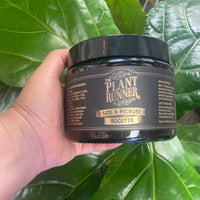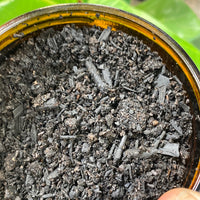

Plant Runner Soil + Microbe Booster 500ml
$22.00
A mixture of biochar and frass.
Promoting a healthy, active, rich substrate for you plant friends.
Here are a few reasons to add this double act to your Plant Care kit:
Frass holds about 240 million microbial colony forming units per gram. It holds up to 200 times more nutrients than worm castings or compost with more diversity of microbes too. They bring life to your potting mix by improving the structure of the soil and providing nutrients to your plants as they break down organic matter.
Biochar keeps plants kicking through dry spells and overwatering. It boosts the capacity of soil to hold nutrients and water, complementing the richness of frass. On its own, it boasts a nitrogen-phosphorus-potassium (NPK) ratio of 4:2:2. But it’s still full of those underrated trace nutrients to help your plants flourish: iron, copper, zinc and so much more.
It’s got some good chitin; the insect exoskeletons that are a natural addition when making frass. This secret weapon activates your plant’s natural defences against pathogens, like the ones that cause root rot. It increases the availability of nitrogen to your plants.
Both are sustainably sourced, carbon-negative and Australian-made.
Separately, frass and biochar do good things. Together, they are amazing.
THE INGREDIENTS
Biochar
Frass
NUTRIENT AND MICROBE ANALYSIS
Total nutrients: Nitrogen – 2.1%, Phosphorus – .8%, Potassium – 1.1%, Calcium – 6.5%, Magnesium – .7%, Sulfur – 0.3%, Sodium – 0.2%
Trace nutrients Aluminium, Boron, Cobalt, Copper, Iron, Molybdenum, Manganese, Nickel , Selenium, Silicon, Zinc
THE DIRECTIONS
Top Dressing
Add 1-2 teaspoons sprinkled around the root zone, once every three months.
Blending into Potting Mix
Add between 0.1 and 1 parts Soil and Microbe Booster to 10 parts potting mix. Mix through well before potting
For Compost
Add between 0.1 and 1 parts Soil and Microbe Booster to 10 parts compost.
FAQS
What is Biochar and how is it different to charcoal?
Charcoal is produced when a biomass is heated at a temperature over 450°C with limited available oxygen. Traditionally it has been used as fuel and can be activated to work as an effective filter. Biochar is simply charcoal that has been produced with the intent to improve soil qualities.
So your biochar is just burnt stuff?
Well, yes. But the difference between this biochar and others is that this has been derived from contaminant free natural wood, leaves and branches. It is created locally, in a controlled environment to increase carbon content and surface activation levels. Interesting side note - biochar is a carbon negative as it takes carbon out of the atmosphere and stores it in the soil.
How does Biochar improve the soil?
Thought you'd never ask!
Promotes microbial activity
Enhances fertiliser effectiveness
Improves soil water and nutirent retention
Let's talk Frass. Never heard of it.
That's ok - you have now! Frass is an organic and natural fertiliser made from insect manure. It...
Wait what? Insect manure?
Yup! Produced right here in Melbourne, this Frass comes from black soldier fly larvae. It's production process is carbon-negative and is a unique plant fertiliser. This Frass is more microbially diverse than other natural fertilisers like worm castings and compost. It has an NPK of 4:2:2 and is full of trace nutrients. It is also an excellent source of Chitin.
What is Chitin?
Chitin can be found in the exoskeleton of anthropods and the cell walls of fungi. The Chitin in this Soil and Microbe Booster comes from the exoskeltetons of the black soldeir fly larvae that are shed during the production process. Chitin can help defend plants from pathogens and promotes the populations of microorganisms that consume pathogenic microbes, like those that cause root rot. Chitin has also been linked to the higher capture of atmospheric nitrogen and improved plant performance. Furthermore, studies have found that exposure to chitin in plants increases the expression of genes involved in the resistance of phytopathogens.


